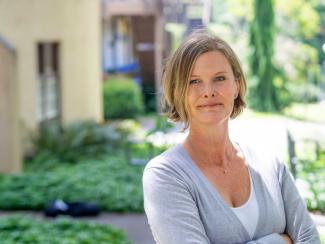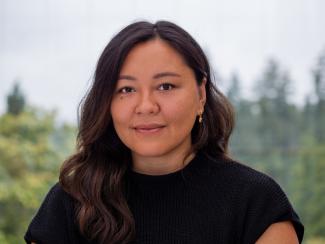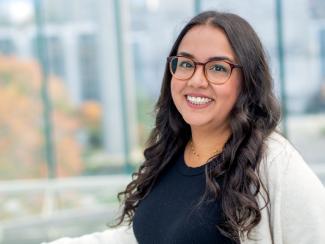UBC's Office of the Vice-President Research and Innovation created the UBC Knowledge Exchange Unit in November 2018 to accelerate and increase societal research impact. The UBC Knowledge Exchange Unit is UBC’s hub for contributing to public dialogue, policy, practice and arts and culture through the sharing of knowledge with communities, government agencies, non-profit organizations in BC, Canada and around the world.
Across the university, we foster a supportive culture of Kx and build capacity through training, resources and tailored support to help researchers engage in meaningful collaborations, communicate research effectively and demonstrate and celebrate the impacts of their work with and within communities.
Our Team

Dr. Genevieve Creighton (PhD) - Knowledge Exchange Manager
As a kid I had a dream that I would be a private detective in the vein of such icons as Nancy Drew, Trixie Belden and Kinsey Millhone. With my (imagined) powers of observation and incisive questioning I would uncover all the secrets, catch the villain and make everything right with the world. While this specific dream faded I stayed interested in finding out things and putting the pieces together to make a picture. This interest led me into academia and an incredible opportunity to study masculinities, grief and suicide. My supervisors, who also came with an activist orientation, mentored me in public scholarship and targeting research towards making an impact. They encouraged me to not only to publish for the academic journals but to think about directing my research findings to those creating health services, groups doing suicide prevention and those who survived the death of a loved one.
I realized that, as much as I (mostly) enjoyed academic life, I was even more interested in how all research could make a difference. My work as the Knowledge Translation Manager at Michael Smith Health Research BC, made me deeply aware of the importance of starting the work of research impact at the beginning, not just the end of a project. I learned and helped to pass on strategies for mapping and engaging knowledge users and, embedding principles of equity, diversity and inclusion and working with stakeholders to target dissemination. I got to know many groups and individuals committed to building pathways from health research to better health, especially for those who have been marginalized and de-centered from the research space.
Starting the position of Manager, Knowledge Exchange in the Vice President’s Office, Research and Innovation in May, 2022 was both challenging and invigorating. What has been most inspiring is to see the way that UBC researchers reach outside their discipline and collaborate to try to find solutions to some of the most urgent issues facing society: the climate crisis, drug poisoning, housing shortages, loneliness and disconnection, loss of language and culture and so many more. We know now that we can’t hold the all the answers by ourselves. The day of the lone private eye (or Principal Investigator) working in isolation is far behind us. As folk singer Ani Difranco writes, we try to keep our eye on the big picture but the picture keeps getting bigger.
Want to learn more about creating your pathway to impact, please reach out!
Email: Gen.creighton@ubc.ca

Ugen Lhazin - Knowledge Exchange Specialist
Throughout my professional journey, I've had the privilege of exploring diverse roles that have shaped my career. I began as a fundraiser for an HIV/AIDS center, then went on to coordinate government-funded programs for individuals with disabilities, supported a research study in Vancouver's Downtown Eastside, conducted drug education programs for youth, and even co-captained my country Bhutan's inaugural national basketball team. Most recently, my role at Michael Smith Health Research BC focused on enhancing knowledge translation capabilities within the province. In each of these dynamic roles, I've come to understand the paramount importance of cultivating trust and forging meaningful relationships to realize a shared vision. I firmly believe that authentic community engagement, open dialogues, and collective action hold the potential to effect positive change, echoing Helen Keller's words: "Alone, we can do so little; together, we can do so much."
I am thrilled to bring together my past experiences in knowledge translation, public engagement, communications, event and project management as I collaborate with the UBC research community and beyond. My role as a Knowledge Exchange (Kx) Specialist is dedicated to providing vital support to researchers and scholars, fostering connections, and engaging with non-academic partners to amplify research uptake and impact.
Seeking knowledge exchange supports, or have questions about upcoming events, please reach out!
Email: ugen.lhazin@ubc.ca

Alia Januwalla - Knowledge Exchange Learning and Development Specialist
I am thrilled to join UBC as a Knowledge Exchange Learning and Development Specialist. I join UBC after 5+ years of experience in knowledge translation in the health research space. In previous roles, I worked with diverse knowledge users to promote the use of integrated Kx strategies, support Kx capacity development initiatives, and amplify research impact within health research. I have a background in public health and community-based research, including specialized training in implementation science and knowledge translation.
My work is often guided by the quote “Nothing about us, without us”, long used by disability rights activists to advocate for people-centered solutions. To me, this quote signifies the importance of positioning equity, inclusion, and community engagement in research and knowledge exchange. I firmly believe that partnered research, co-generated evidence, and co-developed knowledge products are integral to effectively informing impacts on practice and policy.
I look at Kx as a science and an art; it is underpinned by theories, models, and frameworks to ensure rigor and a systematic process, but its inherent success is rooted in adaptability, creativity, and applied curiosity. I am also curious about questions such as ‘what is knowledge?,’ ‘whose knowledge is being centered?,’ ‘whose knowledge is missing?,’ ‘what forms of knowledge do we value over others?,’ ‘what does it mean to decolonize our knowledge systems?,’ and ‘how do we embed equity approaches into knowledge exchange and mobilization?’ I encourage you to join me in seeking answers to these questions, and I am eager to explore these – and many more concepts – through collaborating with internal and external partners to develop Kx capacity building initiatives here at UBC.
Questions about Kx learning opportunities or resources to support your Kx activities, please reach out!
Email: alia.januwalla@ubc.ca
Contact Us
Tel: 604-827-1009
Email: kx.support@ubc.ca
LinkedIn: UBC Knowledge Exchange